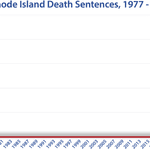
State & Federal
Rhode Island

Famous Cases
The last person executed in Rhode Island was Johnny Gordon, who was hanged on February 14, 1845. It is now believed that anti-Irish sentiment contributed to Gordon’s conviction. Gordon was executed for the mysterious murder of Amassa Sprague, a prominent mill owner who had used connections in the state Senate to have Gordon’s pub shut down. Although Gordon’s two brothers were also charged with the murder, John was the only one who could not produce a strong enough alibi to avoid conviction. Following the conviction, Gordon received the support of the state’s labor movement, which was primarily made up of Irish and Italian immigrants. Following the conviction, petitions were filed with the state government asking for clemency. On appeal, the state’s General Assembly upheld the conviction in a 36 – 27 vote. Governor James Fenner then reviewed the case, but also declined to grant Gordon relief, and the execution was carried out in Februay of 1845. Recently discovered court documents demonstrate that the trial was riddled with anti-Irish and anti-immigrant prejudice. For example, presiding Judge Job Durfee instructed jurors in the trial to lend more credence to the testimony of Yankee witnesses than to Irish witnesses. John Gordon was granted a pardon in 2011 by Governor Lincoln Chafee after the General Assembly passed legislation asking for the posthumous action.
In October, 2011, a memorial headstone was erected for Gordon, reading “Forgiveness is the Ultimate Revenge.’’
In 2011, Governor Lincoln Chafee refused to transfer murder suspect Jason Pleau to federal authorities because Pleau would face the federal death penalty. Pleau agreed to plead guilty to murder and robbery charges in Rhode Island, where he would receive a sentence of life in prison without parole. Chafee said that exposing Pleau to a possible death sentence violated the state’s long-standing abolition of the death penalty. In an Op-Ed piece for The Providence Journal, Chafee said, “To voluntarily let Mr. Pleau be exposed to the federal death penalty for a crime committed in Rhode Island would be an abdication of one of my core responsibilities as governor: defending and upholding the legitimate public-policy choices made by the people of this state.”
Milestones in Abolition/Reinstatement
Rhode Island abolished the death penalty for all crimes on February 11, 1852, becoming one of the first states to do so. The abolition lasted until 1873, when the General Assembly reinstated the death penalty for the crime of murder committed while serving a life sentence. In the wake of the US Supreme Court’s 1972 decision in Furman v. Georgia, Rhode Island rewrote its death penalty law to include a mandatory death sentence for murder committed while under confinement in a state penitentiary. However, the mandatory death sentence was declared unconstitutional by Rhode Island’s Supreme Court in 1979, and on May 9, 1984 the General Assembly removed the death penalty from the Rhode Island Penal Code. Several attempts have been made to reinstate the death penalty, although none have made much progress in the state legislature.


News & Developments
News
Jul 31, 2013
FEDERAL DEATH PENALTY: Controversy With Rhode Island Ends in Plea Deal
The federal death penalty is controversial because it can be applied even in the 18 states, the District of Columbia, and Puerto Rico that have elected not to have capital punishment in their own law. Out of respect for the people of Rhode Island–a non-death penalty state – the governor, Lincoln Chafee (pictured), resisted turning over a defendant in 2011 to face the federal death penalty. The defendant, Jason Pleau, agreed to plead…
Read MoreNews
Aug 25, 2011
NEW VOICES: Rhode Island’s Governor Explains His Resistance to Federal Death Penalty Case
Rhode Island Governor Lincoln D. Chafee (Indep.) recently explained his denial of a request to transfer Jason Pleau to the federal government for a potential death penalty prosecution. Chafee stated, ” As a matter of public policy, Rhode Islanders have long opposed the death penalty, even for the most heinous crimes. To voluntarily let Mr. Pleau be exposed to the federal death penalty for a crime committed in Rhode Island…
Read More